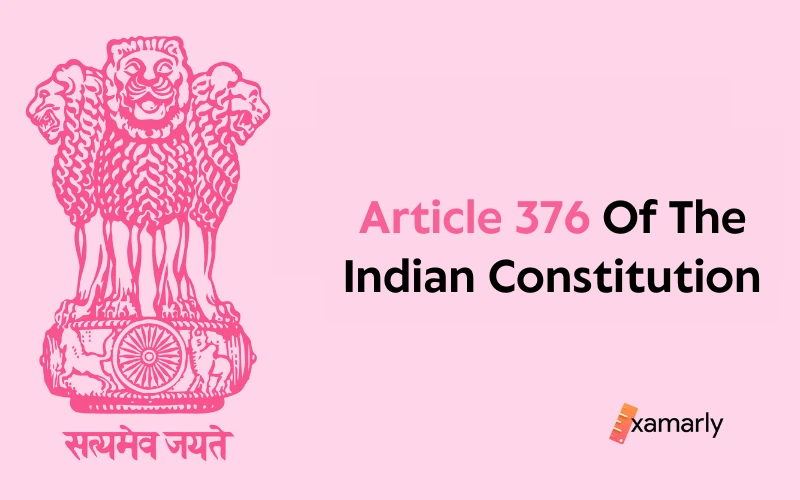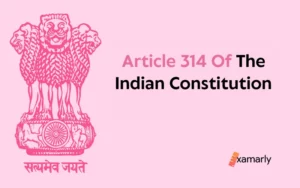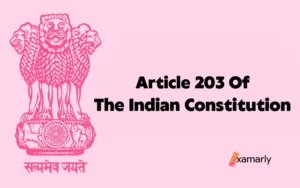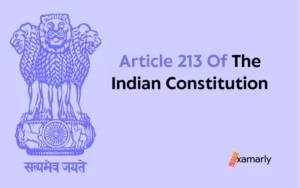An Overview
The Indian judiciary is a vital component of the democratic system of the country, and the High Courts play a crucial role in maintaining the rule of law and protecting the rights of citizens. The appointment, tenure, and removal of High Court judges are governed by specific provisions in the Indian Constitution.
In this blog, we will take a closer look at these provisions of Article 376 of the Indian Constitution, which outline the process of appointing High Court judges, their eligibility criteria, and the process of removal from office.
Additionally, we will also discuss the rights and privileges of High Court judges, such as their salaries and pensions.
The aim of this blog is to provide a comprehensive understanding of Article 376 of the Indian Constitution and its provisions with respect to the Judges of High Courts in India.
- An Overview
- Article 376 Of The Indian Constitution: Provisions Related To High Court Judges
- Clause (1) Of Article 376 Of The Indian Constitution: Explained
- Clause (2) Of Article 376 Of The Indian Constitution: Explained
- Clause (3) Of Article 376 Of The Indian Constitution: Explained
- Summing Up
- FAQs Related To Article 376 Of The Indian Constitution
- Which Chapter Of The Constitution Of India Does Article 376 Of The Indian Constitution Fall Under?
- What Happens To The Judges Of A High Court In A Province At The Commencement Of The Indian Constitution?
- Are Non-Citizen Judges Eligible For Appointment As Chief Justice Of A High Court?
- What Happens To The Judges Of A High Court In An Indian State Specified In Part B Of The First Schedule At The Commencement Of The Indian Constitution?
- Does The Expression "Judge" In Article 376 Of The Indian Constitution Include Acting Judges or Additional Judges?
- What Is The First Schedule Of The Indian Constitution?
- What Do You Understand By Part B Of The First Schedule Of The Indian Constitution?
Article 376 Of The Indian Constitution: Provisions Related To High Court Judges
Article 376 of the Indian Constitution holds provisions that are specifically concerned with the Judges of High Courts. Let us look at each of the clauses of this article to gain a deeper understanding of this article.
Clause (1) Of Article 376 Of The Indian Constitution: Explained
(1) Notwithstanding anything in clause (2) of article 217, the Judges of a High Court in any Province holding office immediately before the commencement of this Constitution shall, unless they have elected otherwise, become on such commencement the Judges of the High Court in the corresponding State, and shall thereupon be entitled to such salaries and allowances and to such rights in respect of leave of absence and pension as are provided for under article 221 in respect of the Judges of such High Court. [Any such Judge shall, notwithstanding that he is not a citizen of India, be eligible for appointment as Chief Justice of such High Court, or as Chief Justice or other Judge of any other High Court.]
The first clause of Article 376 of the Indian Constitution talks about the transfer of Judges from a High Court in a Province to a corresponding State High Court at the commencement of a new Constitution. It states that the Judges who were holding office in a High Court of a Province immediately before the commencement of the Constitution will automatically become Judges in the corresponding State High Court unless they have chosen otherwise. These Judges will be entitled to the same salaries, allowances, rights for leave of absence, and pensions as the Judges of the State High Court as outlined in Article 221 of the Indian Constitution.
Additionally, the clause states that even if a Judge is not a citizen of India, they will still be eligible for appointment as the Chief Justice. They may also be eligible to be appointed as any other Judge of the State High Court or any other High Court. This provision was added to clause (1) by the Constitution (First Amendment) Act, 1951.
A point to be noted here is that the provision contained in this clause does not take into consideration whatever is mentioned in clause (2) of Article 217 of the Indian Constitution.
Clause (2) Of Article 376 Of The Indian Constitution: Explained
(2) The Judges of a High Court in any Indian State corresponding to any State specified in Part B of the First Schedule holding office immediately before the commencement of this Constitution shall, unless they have elected otherwise, become on such commencement the Judges of the High Court in the State so specified and shall, notwithstanding anything in clauses (1) and (2) of article 217 but subject to the proviso to clause (1) of that article, continue to hold office until the expiration of such period as the President may by order determine.
The second clause of this article discusses the transfer of Judges from a High Court in an Indian State to a High Court in a State specified in Part B of the First Schedule of the Indian Constitution at the commencement of a new Constitution.
It states that the Judges who were holding office in a High Court in an Indian State immediately before the commencement of the Constitution will automatically become Judges in the High Court in the State specified in Part B of the First Schedule of the Indian Constitution unless they have chosen otherwise.
These Judges will continue to hold office until the expiration of a period that the President may determine by order, regardless of anything mentioned in clauses (1) and (2) of Article 217 of the Indian Constitution. However, it is subject to the proviso to clause (1) of that article.
This means that the order of the President of India determining the period of the continuation of the Judges in the office is subject to any limitations or conditions specified in the proviso to clause (1) of Article 217 of the Indian Constitution.
Clause (3) Of Article 376 Of The Indian Constitution: Explained
(3) In this article, the expression “Judge” does not include an acting Judge or an additional Judge.
This third clause of this article clarifies the scope of the term “Judge” as used in the article. The clause states that the definition of “Judge” in this article does not consider individuals who hold the positions of an acting Judge or an additional Judge.
An “acting Judge” refers to a Judge who temporarily holds the position of a Judge, usually because the permanent Judge is unavailable due to illness, vacation, or other reasons. They are appointed to act as a Judge for a specific period of time.
An “additional Judge” refers to a Judge who is appointed temporarily to a High Court in addition to the permanent Judges, usually to clear a backlog of cases or to help with an increased workload. They are appointed for a specific period of time and do not have a permanent position.
Therefore, this clause states that the rules and regulations mentioned in the article are not applicable to acting Judges or additional Judges.
You Might Also Like:
| Article 372 Of The Indian Constitution | Article 373 Of The Indian Constitution |
| Article 374 Of The Indian Constitution | Article 375 Of The Indian Constitution |
Summing Up
The key learnings gathered from Article 376 of the Indian Constitution can be summed up in the following points.
- Article 376 of the Indian Constitution deals with the transfer of Judges from a High Court in a Province to a corresponding State High Court at the commencement of a new Constitution.
- Judges who were holding office in a High Court of a Province immediately before the commencement of the Constitution will automatically become Judges in the corresponding State High Court unless they have chosen otherwise.
- Non-citizen Judges are also eligible for appointment as the Chief Justice or other judge of the state High Court or any other High Court.
- These Judges will continue to hold office until the expiration of a period that the President of India may determine by order, subject to any limitations or conditions specified in the proviso to clause (1) of Article 217 of the Indian Constitution.
- The definition of “Judge” in this article does not take into consideration such individuals who hold the positions of either an acting Judge or an additional Judge.
FAQs Related To Article 376 Of The Indian Constitution
Which Chapter Of The Constitution Of India Does Article 376 Of The Indian Constitution Fall Under?
Article 376 of the Indian Constitution falls under Chapter XXI of the Constitution of India. The chapter contains articles dealing with temporary, transitional, and special provisions.
What Happens To The Judges Of A High Court In A Province At The Commencement Of The Indian Constitution?
The Judges of a High Court in the Province who were holding office immediately before the commencement of the Indian Constitution will unless they have been elected otherwise, become the Judges of the corresponding High Court of the State. They will be entitled to the same salaries, allowances, leave of absence, and pension as provided for under article 221 for the Judges of that High Court.
Are Non-Citizen Judges Eligible For Appointment As Chief Justice Of A High Court?
Yes, as per the provisions of Article 376 of the Indian Constitution, any such Judge as specified in clause (1) of the article shall be eligible for appointment as Chief Justice of such High Court, or as Chief Justice or other Judge of any other High Court. This is applicable even to Judges who are not a citizen of India.
What Happens To The Judges Of A High Court In An Indian State Specified In Part B Of The First Schedule At The Commencement Of The Indian Constitution?
The Judges of a High Court in an Indian state specified in Part B of the First Schedule, who were holding office immediately before the commencement of the Indian Constitution, will, unless they have been elected otherwise, become the Judges of the High Court of the State, and will continue to hold office until the expiration of such period as the President may by order determine.
Does The Expression “Judge” In Article 376 Of The Indian Constitution Include Acting Judges or Additional Judges?
No, the expression “Judge” in this article takes a specific meaning. It does not include acting Judges or additional Judges.
What Is The First Schedule Of The Indian Constitution?
The First Schedule of the Indian Constitution contains the Union and Territory provisions. It lays out the territories of the various States and union territories in India, as well as the territories of the tribal areas. It also describes the boundaries of the States and the union territories and the powers and jurisdiction of the Central government and the State governments over these territories.
It also lists the territories that were merged with India during the time of the drafting of the Indian Constitution in 1947. It also has Part A and B, where Part A lists the territories of the states and Part B lists the territories of the union territories.
The schedule is divided into fourteen parts and each part lists the territories of the respective States or union territories. The schedule can be amended by the Parliament of India under the provisions of Article 4 of the Indian Constitution.
What Do You Understand By Part B Of The First Schedule Of The Indian Constitution?
Part B of the First Schedule of the Indian Constitution lists the territories of the Union Territories of India. Union Territories are administrative divisions of India that are directly controlled by the Central Government, rather than by the State governments. They are not considered fully-fledged States and do not have a separate State government.
The Union Territories are listed in Part B of the First Schedule of the Indian Constitution, along with their geographical boundaries and the powers and jurisdiction of the Central Government and the Union Territory Government. The Schedule can be amended by the Parliament of India under the provisions of Article 4 of the Indian Constitution.






